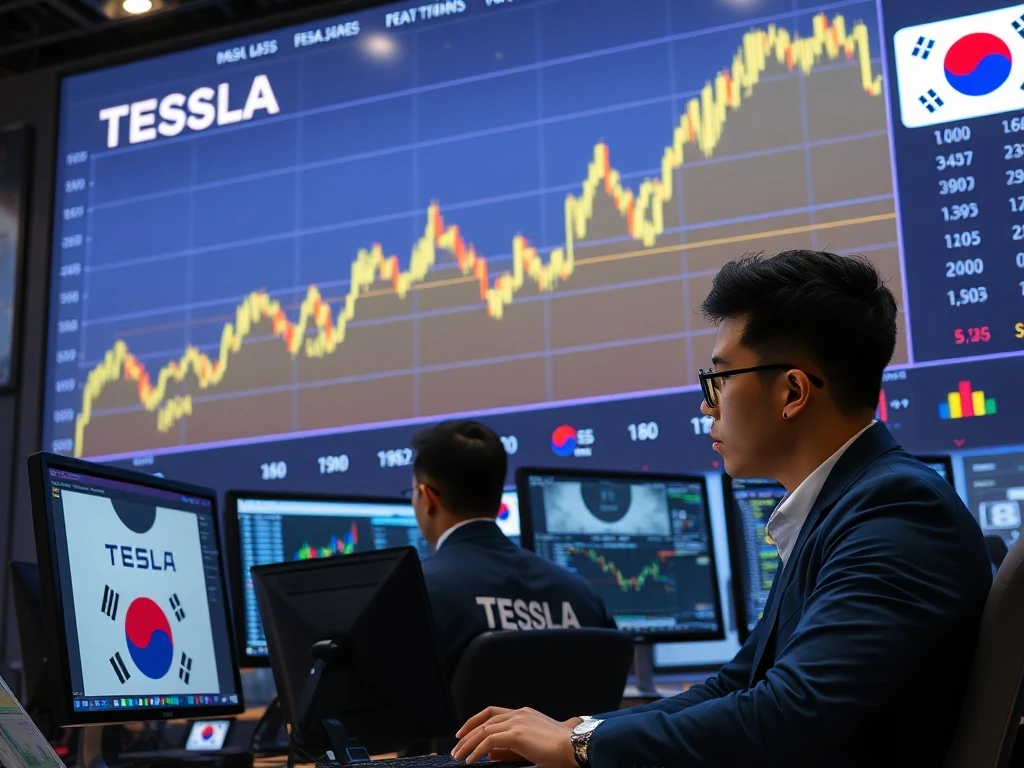South Korea’s retail investment landscape is undergoing a dramatic transformation as investors abandon traditional tech giants for emerging crypto proxies. In August 2025 alone, retail traders sold $657 million in Tesla stock while pouring $253 million into cryptocurrency-linked assets, signaling a fundamental shift in risk appetite and technological optimism.
The Crypto Proxies Revolution in South Korea
South Korean investors are increasingly turning to crypto proxies as their preferred investment vehicle. These digital asset-linked securities offer exposure to blockchain technology without direct cryptocurrency ownership. Consequently, platforms like Bitmine Immersion Technologies have seen massive inflows, attracting $253 million as an Ethereum proxy investment. This trend reflects growing confidence in decentralized finance ecosystems.
Tesla’s Narrative Erosion
Tesla’s appeal has significantly weakened among South Korean retail investors. Many cite the company’s stagnant AI progress and lack of compelling technological breakthroughs. Additionally, leveraged Tesla ETFs experienced record outflows of $554 million in August 2025. Investors now seek more dynamic growth stories elsewhere.
Regulatory Catalyst for Crypto Proxies
Government policies have accelerated the adoption of crypto proxies in South Korea. The Financial Services Commission’s 2025 reforms include:
- Venture company classification for crypto firms
- Won-backed stablecoin introduction
- Institutional trading approval framework
- Spot ETF phased rollout
These measures contrast sharply with Tesla’s regulatory environment, which lacks similar supportive tailwinds.
Demographic Shifts Driving Change
Younger investors dominate this shift toward crypto proxies. Web3 enthusiasts and digital natives prefer assets with perceived disruptive potential. By June 2025, crypto-linked stocks represented 36.5% of top foreign purchases, up from just 8.5% in January. This generation views traditional tech stocks as less innovative.
Market Implications and Risk Assessment
The move toward crypto proxies represents a broader risk-return recalibration. South Korean investors now prioritize high-growth potential over stability. However, this strategy carries inherent volatility risks. Regulatory changes or market downturns could quickly reverse current trends. Investors must carefully monitor macroeconomic conditions.
Future Outlook for Crypto Proxies
The sustainability of this investment shift depends on multiple factors. Regulatory stability remains crucial for continued crypto proxy adoption. Technological advancements in blockchain infrastructure will also influence investor confidence. Meanwhile, traditional companies must innovate to recapture market interest.
Frequently Asked Questions
What are crypto proxies?
Crypto proxies are traditional securities like stocks or ETFs that provide exposure to cryptocurrency markets without direct digital asset ownership.
Why are South Korean investors shifting from Tesla?
Investors cite Tesla’s lack of compelling AI progress and greater excitement around cryptocurrency’s disruptive potential and regulatory support.
How significant is this investment shift?
Very significant—$657 million moved out of Tesla while $253 million flowed into crypto proxies in just one month, representing a major portfolio reallocation.
What role did regulation play?
South Korea’s 2025 regulatory reforms legitimized crypto investments, providing institutional frameworks that reduced hesitation among retail investors.
Are crypto proxies safer than direct cryptocurrency investments?
While still volatile, crypto proxies operate within traditional regulatory frameworks, offering some investor protections not available in direct crypto markets.
Will this trend continue internationally?
Similar patterns may emerge in other markets as regulatory clarity improves and younger investors seek exposure to emerging technologies through familiar investment vehicles.


